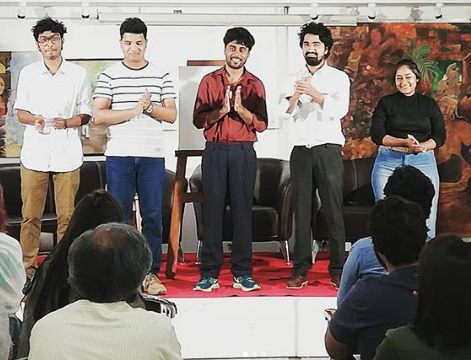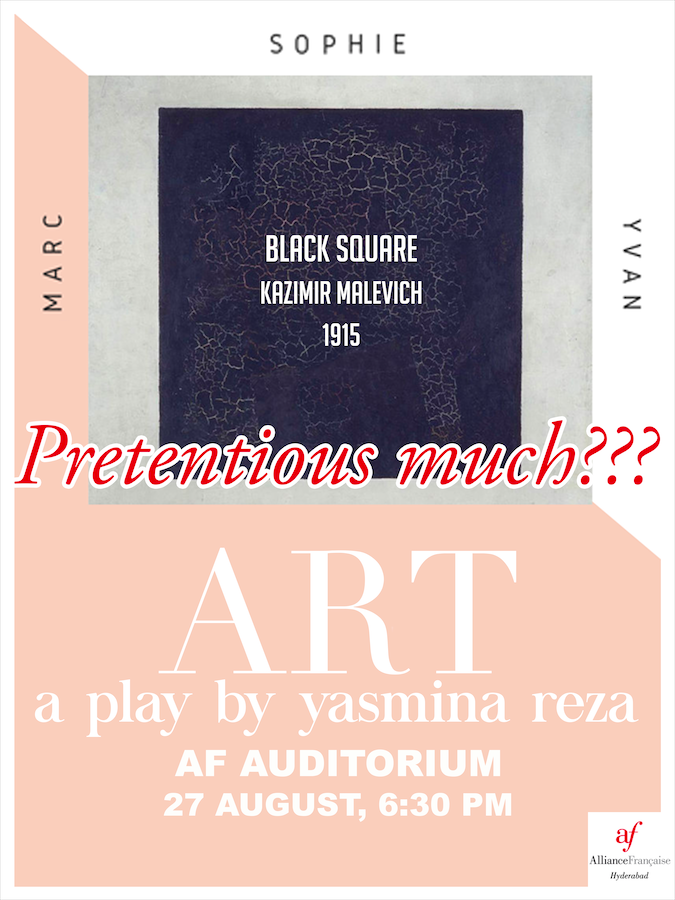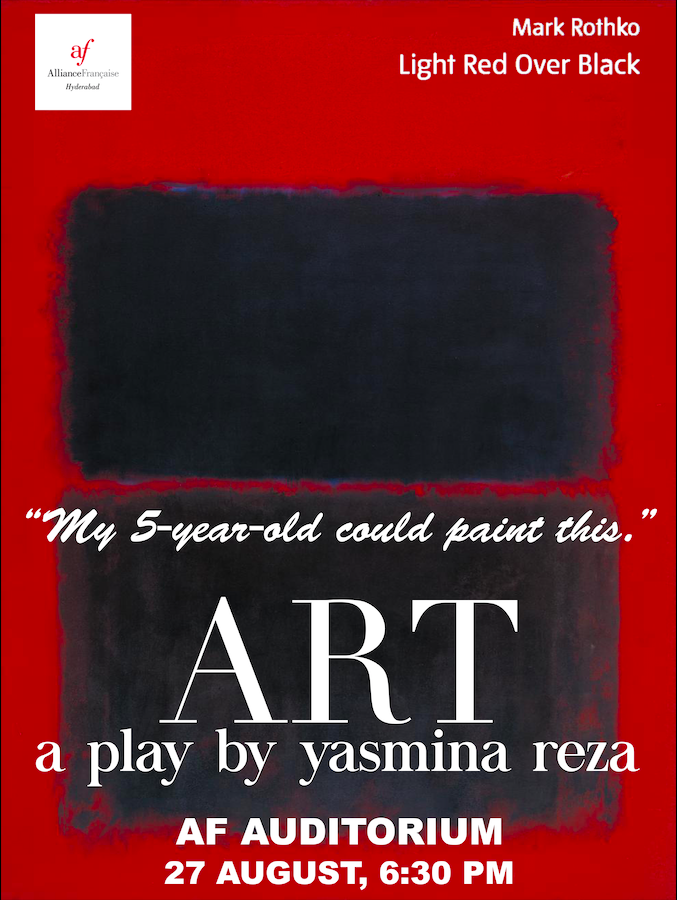English adaptation of the French play Art, by Yasmina Reza (1994)
*
Interview by Laure-Anne Dobler
*
Director: Purushothama Pani Pondi
Actors: Aarthy Rajendran as Sophie/Serge; Purushothama Pani Pondi as Yvan; Srinivas Reddy Ramreddy as Marc
Music: Joshua Alphonso Mario – Keyboard
Technics: Sudharsan Solaimalai – Lights
*

Could you explain how this project started? Why did you choose to do this play in particular?
Purushothama: During the reading sessions at the AF Hyderabad, we used to do short extracts of plays. I read the play Art by Yasmina Reza and I found it very interesting.
Aarthy and I played the first two scenes in French. We found the text available online for free. It was in front of the Consul Général of Bangalore. Apparently, he really enjoyed it.
I wanted to do this play because, it needs only a simple and practical setting, not much “mise en scène”. We just wanted to do this play. We loved the story, we just wanted to show this play to an Indian audience. It’s a masterpiece, it’s shouldn’t remain unheard of or unseen in India.
Why playing it in English?
Aarthy: Purushothama and I really wanted to do it in French, because many things are lost in translation, I think. But the thing is, that if we invite people, very few people would understand it here. We didn’t find a third actor able to speak French anyway. Maybe we’ll do it when Purushothama will be back from his exchange from France. It is still a project that we are keeping in mind.
Purushothama: Yes, Aarthy and I wanted at first to do the play in French, but we found Srinivas, who is a really talented actor. Srinivas tried to read French and play it by-heart.
Aarthy: But how can you give emotions to lines that you can’t understand? We thus decided to do it in English.
How did you prepare?
Purushothama: We got involved heart and soul. It required a lot of dedication and sacrifice. You need to give 100%.
Aarthy: Literally, we lived together for the past two months. Srinivas and I were working, we couldn’t rehearse at random times. Srinivas was working 9 to 10 hours a day, very far from where we rehearsed, so he used to come late in the night after work, sometimes without having even eaten.
Purushothama: We worked so hard for this play. We rehearsed during the night or early in the morning. I really admire Srinivas for what he has done. He used to come late in the night to read and learn his lines, all alone, because Aarthy and I were already sleeping.
Do you have experience in acting?
Aarthy: I had no experience. The first time I played on stage, was the short extract of the play during the Reading Session in front of the Consul Général. I wasn’t experienced at all, but Purushothama and Srinivas both helped me. I was afraid but I accepted to give it a try. It was difficult for me to play Sophie, because I don’t know how to react to criticisms. Sophie gets very harsh criticisms from Marc.
Srinivas: I have three years of experience. I played between 10 to 15 plays, in English, Hindi, and Telugu.
How did you divide up the roles between each other?
Purushothama: The division of the role was a lot of compromise.
Srinivas: The play is made up of three male characters. We needed to fill one of the roles with a female actor. I first thought of playing Yvan because I’m more like him. But Purushothama wanted to take the part, because he’s directing.
Purushothama: Yvan has mostly monologues. I could just come in at the last second and give my monologues. It was easier for me to direct.
Srinivas: Purushothama playing Yvan, I thought that it could be an opportunity to go out of my comfort zone. I told myself “Why can’t I play Marc?”. I tried to define Marc’s character, to know how his personality is, how he behaves, how he sits, how he leans back, etc. He is a very confident man.
With Yvan, he is very natural, he laughs very loudly, and he is tactile. But in front of Sophie, he tries to be composed, but he loses his temper. I wanted to define his body language, and adapt it to Sophie and Yvan.
Aarthy: We thus decided to change Serge’s character and make him a woman, called Sophie, the character I play.
About the choice of lighting, you decided to emphasize the ‘asides’ by isolating with the lights the character from the others in the play. Why?
Aarthy: We didn’t think of stage lights until the last moment. If you are projected separately, it really adds something to the monologue. So Purushothama had the idea to use a spotlight. A lot of people helped us. Our friends came up to help with the lights.
You chose to use music in the background throughout the play. Why this choice?
Purushothama: I use to listen to an audiobook of the play. There was transition music that was being played, that set up the mood for the next scene. I thought: “Why not adding some music on stage?”. We found an excellent keyboard player, Joshua. We asked him to play some music for some of the monologues, to add more gravity. We didn’t find it necessary for the funny monologues.
Aarthy: Once, Purushothama used background music for his monologue where he is explaining to the two other characters his phone call with his mother and his fiancée. He does three characters at once, changing his voice, adding more expressions to his face. Srinivas and I watched this, and for us, it was like a psycho-thriller. Background music can really change a scene.
Purushothama: Yes, I looked like a psychopath.
Did you rehearse in front of your friends to get some feedback?
Aarthy: When we played in front of them, they were nice to us, but they didn’t laugh. We were like OK, if they don’t laugh, we will record the laughter and we will put it on at the right moment. (laugh)
On stage, when the audience started laughing, I was really thrilled and got the motivation to do more. I was so nervous, but it really pushed me.
Purushothama: That was her first play. The person who progressed the most in this play, it’s her. She has gone from a complete amateur, to an excellent level of theatrics.
Srinivas: So many people would pay to do theatre workshops; they won’t do as much progress as she did.
Aarthy: I don’t know how to react to compliments (laugh).
How did you feel about the reactions of the audience during the show? Did it laugh at unexpected moments? Or on the contrary, it really behaved as you expected?
Aarthy : There were many laughs at places we didn’t expect.
Srinivas: I didn’t expect that people would laugh at Marc’s dialogues, he is very serious.
Purushothama: I had the feeling that when Marc and Sophie speak, it gets very intense. But when we played it in front of the audience, I don’t know, the audience picked up on things that we never picked up on. They started laughing at Marc’s jokes, so it was quite surprising.
My goal from the beginning was to make even the serious scenes sound funny. I wanted nobody to have any kind of seriousness in the play. However, some parts of the dialogue are very intense, so you can’t avoid a certain level of seriousness. Somehow, the audience picked up the funny part.
Srinivas: There are so many sarcastic moments, coming from Marc. He was saying things in such an indirect way.
The play has met with great success in France and abroad, because even if it takes place in France, in the Parisian bourgeoisie, it is a universal play that primarily speaks about friendship. How did you want to depict this?
Purushothama: When we were reading the play, it appears to us that this play is universal. Two universal themes appear in the play. First, it is about friendship. It is about three friends in a context of an argument.
Secondly, it is about modern art. In this play, the piece of art is an element triggering the argument between friends.
In an argument, there are three sides: thesis, antithesis, and synthesis. But synthesis doesn’t exist in real life. Ignorance exists. Let’s take the God argument. God exists, God does not exist, and an agnostic.
In the frame of the play, Sophie considers that modern art has its own value. Marc on the contrary thinks that modern art is not art at all. Yvan is just the guy who doesn’t care about this discussion and asks “can we stop discussing, and go have dinner”.
Srinivas: In real life, I’m Yvan. Whatever we argue about, I’m like ‘I don’t care, let’s move on”.
Purushothama: Modern art is universal. You can find a piece of modern art everywhere in the world. Marc takes the point of view of all the people who question the astronomical costs of certain paintings. Sophie is the art connoisseur who says that it should cost so much, because there is a system behind these works. They are artistic works. Yvan is the agnostic guy. He doesn’t bother about these kinds of debate. He just wants to sustain the friendship.
Did you get inspired by an actor (Fabrice Luchini, Pierre Arditi or Pierre Vaneck who did the premiere in the 1990s, or others) to play your character? How did you want your character to be? In this play, the characters can easily become stereotypes, did you want to avoid this, or instead, play with it?
Purushothama: When I was going through the play, I took inspiration from different plays that I have seen. Fabrice Luchini play was getting very serious. But the play in the American Theatre, with Brian Cox (Scottish actor) stages very light-hearted characters, who speak like normal people, but are art connoisseurs. It is much more relatable to the audience that way. In an audience, you can’t expect them to be art connoisseurs. I just wanted the characters to be normal people.
Srinivas: I wanted to work on Marc’s relationship with Sophie. I wanted to have background stories about Sophie and Marc, concerning the first time they met, how they met, how they used to discuss art. Concerning Yvan and Marc’s relationship, I had no idea of what bound them together. I don’t have a real understanding of their relationship. Sophie and Marc have an intellectual relationship, they discuss art. But Yvan and Marc have more of an ‘emotional’ relationship.
I also wrote background stories about Paula, Marc’s wife. I wanted to be sure of the power dynamics between them. For instance, Marc takes homeopathy pills, because of Paula, to please her. He loves her. He wants to sustain that relationship. That’s why he accepts to do whatever she asks.
Purushothama: I found Marc and Sophie’s relationship very interesting. If you read the play, there is almost a homosexual angle to it. When Serge says, “I didn’t replace you with the Antrios” and when Marc says “I didn’t replace you with Paula”. There is a whole possession thing going on. Moreover, Sophie divorced from her husband, I wanted Marc to be the reason.
How did you react to the first reading of the play? Which character inspired you the most, and why? Did you have some empathy for one of them?
Srinivas: When I read it for the first time, I felt it to be lengthy. After going home, I read it twice, and I found it very interesting. So I went to Purushothama, and said: “We need to do it, it’s so good”.
Aarthy: At the beginning, I was afraid. I was not very comfortable with my lines. I was more like Yvan. I don’t articulate well in English. It was very difficult for me. I couldn’t put emotions to words.
Normally I’m very comical, I’m very expressive. But I could not find this comical energy in Sophie’s dialogues. One day, I sat at my desk, read the dialogues and I understood what it meant.
At the beginning of the rehearsals, I gave my dialogues, waiting between the other characters’ lines. I wasn’t very good, and I felt bad. Then I tried to read it as a story and actually listen to the other characters. I managed to be more natural. I wasn’t stumbling, or thinking of what I had to say. Then it was easy. Unlike Srinivas, I didn’t write background stories. Instead, I tried to think of how I would react myself in these situations. Normally, I wouldn’t spend that much time discussing or arguing.
When someone criticises what I like, I can’t take it. I am more emotional. I wouldn’t be like Sophie, arguing back. I would more start crying. I’m more like Yvan. So I thought, I would try to be angry.
What are your projects in the future?
Aarthy: Srinivas is very serious about theatre. He’s going to be a full time actor.
Srinivas: Yes, I’m part of a Theatre Group in Hyderabad called Story Board Productions.
Purushothama: I’m going to France to be an English assistant. Maybe, I’ll join a theatre group there, to play in French. But I want to pursue direction, or cinematography. That’s what interests me.
Aarthy: I don’t really know yet. I prefer to take things as they come.
Purushothama: But she’s a great actress. I want her to do more plays, to explore.
Aarthy: I can talk, so maybe, a job in which I can demonstrate my talking skills (laugh).
Purushothama: She would be a very talented Stand-Up. She continuously makes us laugh.
Aarthy: I’ve always been a clown. I’m comfortable being a clown. So maybe, a clown.



